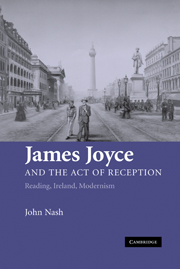Book contents
- Frontmatter
- Contents
- List of figures
- Acknowledgements
- Textual note
- Introduction: writing reception
- 1 Boredom: reviving an audience in Dubliners
- 2 Surveillance: education, confession and the politics of reception
- 3 Exhaustion: Ulysses, ‘Work in Progress’ and the ordinary reader
- 4 Hypocrisy: Finnegans Wake, hypocrites lecteurs and the Treaty
- Afterword
- Notes
- Bibliography
- Index
4 - Hypocrisy: Finnegans Wake, hypocrites lecteurs and the Treaty
Published online by Cambridge University Press: 22 September 2009
- Frontmatter
- Contents
- List of figures
- Acknowledgements
- Textual note
- Introduction: writing reception
- 1 Boredom: reviving an audience in Dubliners
- 2 Surveillance: education, confession and the politics of reception
- 3 Exhaustion: Ulysses, ‘Work in Progress’ and the ordinary reader
- 4 Hypocrisy: Finnegans Wake, hypocrites lecteurs and the Treaty
- Afterword
- Notes
- Bibliography
- Index
Summary
… we were like bro and sis over our castor and porridge… He feels he ought to be as asamed of me as me to be ashunned of him. We were in one class of age like to two clots of egg. I am most beholding to him, my namesick, as we sayed it in our Amharican, through the Doubly Telewisher … It will pleased me behind with thanks from before and love to self and all I remain here your truly friend. I am no scholar but I loved that man who has africot lupps with the moonshane in his profile, my shemblable! My freer!
(FW 489.15–28)Finnegans Wake is a book that cannot have an epigraph. To do so would set up a relation, even perhaps hint at a genealogy, between text and predecessor, within which an implicit readerly position would also be assumed. An epigraph typically functions as a form of address to the ‘competent’ reader. Instead, the Wake's citations – as above, to Baudelaire (‘– Hypocrite lecteur, – mon semblable, – mon frère!’) and others – are gestures and echoes that hint without stating. If, as the previous chapter suggested, the Wake contains an ‘anarchive’ of Joyce's reception, it acts in this way towards all its sources: unable to quote or to represent, it instead transforms and enacts a reading of the myriad texts from which it is drawn.
- Type
- Chapter
- Information
- James Joyce and the Act of ReceptionReading, Ireland, Modernism, pp. 131 - 163Publisher: Cambridge University PressPrint publication year: 2006



